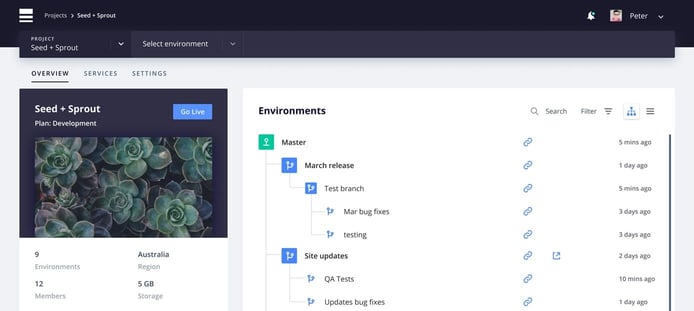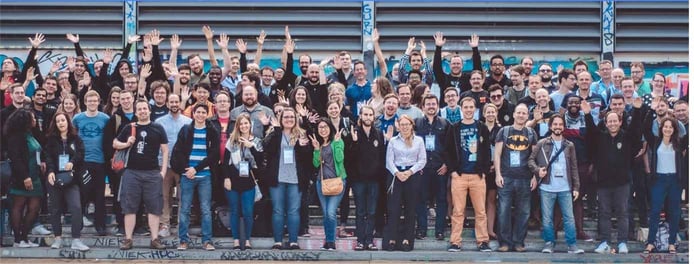
TL; DR: Platform.sh introduces a reliable way to safely deploy updates created in a cloned production environment by removing any fears about breaking your website or application in the middle of a critical traffic spike. The company’s multi-cloud platform streamlines infrastructure configuration and management to simple YAML files, enabling developers and startups to more easily launch and scale containerized or headless applications. Vice President of Marketing Chris Yates shared his own experiences using Platform.sh and how the user-focused company continuously aims to simplify development and delivery.
Imagine you’re in charge of the online presence and web applications of a major retail chain. Or maybe a professional sports team, or perhaps the Academy Awards. The doors are about to open on Black Friday sales, your players are about to kick off the championship game, or the Best Picture envelope is being opened. Terrible time for your website to crash, right?
For many massive brands and ecommerce businesses, those are the absolute worst times to update a website or deploy changes to an app — and also the most important. That’s also where Platform.sh thrives, enabling businesses to run, deploy, and scale applications with the year-round agility.
Drawing from experience building complex Drupal-powered sites for enterprise ecommerce brands, the Platform.sh leadership noticed a lack of tools to maintain, manage, and continuously develop those sites, according to Vice President of Marketing Chris Yates, especially for businesses facing extreme pressure during specific times that generate a significant portion of revenue.
“What we found is that most of those customers were unwilling to make changes to their application during those times of the year for fear of breaking the site and having outages because of the development work they were doing,” Chris said. “That causes a paralysis with regard to the company’s ability to respond to the market, respond to their customers, and respond to their competitors. They can’t innovate all the time and be responsive to their most important stakeholders.”
The Platform.sh approach to polyglot, multi-cloud hosting provides end-to-end infrastructure configuration and management, giving startups and enterprises a chance to streamline workflows around business growth and success instead of tedious server maintenance.
“In a self-serving way, we built a set of tools we would want to use and have used for making changes to a web application that is under stress and high levels of traffic,” Chris said. “We’re really a Platform-as-a-Service that provides an end-to-end platform for building, maintaining, hosting, and scaling their applications.”
Version Controls Provide Oversight on Workflows and Infrastructure
Chris Yates isn’t your typical Vice President of Marketing. As a former developer and director of various engineering and product teams, he’s more equipped than most to talk knowledgeably about tech while expanding the platform’s reach. He’s especially useful at Platform.sh, where he doubles as a user who commits code almost daily.
“What I really love about Platform.sh is that for every change I want to make on the website, whether I’m simply adding a new blog post, experimenting with some changes to a landing page, or implementing some new interactive feature, every one of those changes is a branch in my version control system,” he said.

Platform.sh draws inspiration from version control systems developers are already familiar with to streamline deployments.
With support for any PHP framework, along with Python, Ruby, Go, Node.js, and Java, Platform.sh is based around Git and source control systems for overseeing code updates as well as workflow components and infrastructure configuration. Users create and edit YAML files to specify what an application needs, from programming languages and software to databases and local or network storage.
“We have a continuous integration and continuous deployment system that reads those files and builds those environments for the user,” Chris said. “For every single change, I’ll want to create a branch or pull request, and Platform.sh automatically creates an instant clone environment of the production stack, whether it’s something simple like my marketing website or an ecommerce application with millions of products in a database.”
That cloned environment gives developers the confidence to merge changes back into production, knowing that he or she was operating with exactly the same infrastructure, code, and data currently running in production.
“Everything you’ve done is going to work in production when you do a merge, which is all it takes to deploy because you’ve tested it on something that matches byte for byte,” Chris said. “That’s a real game changer from a developer’s perspective, but also from a business owner’s or project manager’s perspective — I don’t have to take anyone’s word for it. All my tests are going to work exactly the same as they would in production, and I can be really confident when I make the change on Black Friday. I’m doing the exact same process in an automated fashion on something that mirrors production. I know it’s going to work.”
Mainstreaming Containers and the Shift Toward Composite Applications
Bolstering the rise of Platform.sh, according to Chris, is the growing popularity of microservices — with Docker leading the charge since 2014 and Kubernetes a year later. The company got a head start on the trend by building a fully containerized application platform before the Kubernetes container orchestration platform existed.
“It takes some similar approaches, in that what we’re trying to do is help the developers and organizations they work for focus on what’s really important to them,” Chris said. “It’s not enough to maintain servers or application containers, it’s about writing good code that delivers features that customers and stakeholders demand. We allow our customers to set aside any concerns about maintenance, about figuring out how different elements of their stack need to work together, and move it all to a simple configuration file.”

The Platform.sh team resides in four global locations: France, Germany, the U.S., and the U.K.
Comparing Platform.sh to a more modern do-it-yourself management as compared with the more traditional, conventional maintenance of a VPS, Chris credited Docker and Kubernetes for drumming up enthusiasm for making the transition to microservice architectures. Similarly, he also observed an industry shift toward decoupled or headless applications that combine multiple components and independent functions.
“Fewer and fewer applications involve a single language or framework,” he said. “You need to be able to support a variety of tooling on the hosting side to run those applications, but you also need to have support for a variety of tooling workloads to continuously build those applications and deploy those apps into production.”
Platform.sh Empowers Customers to Create Faster and Launch Sooner
In a nod to customers like the retail chain, sports team, awards show, and along with countless other fast-moving online businesses, Chris mentioned the unwritten developer rule of not deploying on Fridays — unless you want to spend your weekend fixing something that broke at the end of the day.
“We’ve actually turned that on its head and have adopted Deploy Fridays as one of our internal slogans,” he said. “The idea we have is that everything should be so automated and so trustworthy that you can trust your process and deploy whenever you want.”
Platform.sh employees actually checked the systems merge logs on Black Friday last year to see how the company was serving those customers — and were pleased with the results.
“We had a huge amount of activity, as people were making changes, making improvements, reacting to the market, and getting in front of competitors,” Chris said.
Instead of describing Platform.sh as a hosting company or business that produces helpful developer tools, Chris said he chooses to tell people the organization is in the “time-to-value business.” When talking to early-stage tech startups, he noticed Platform.sh is especially useful for solving the balance of getting things done right and getting them launched quickly.
“If you can shift that effort you would be putting into the infrastructure back into that feature or value creation, you’re able to move so much faster with the same team,” he said. “The infrastructure and process management bits take away time from solving customer problems and delivering better products than your potential competitors. That’s why we’re in the business of helping people focus and move faster.”
HostingAdvice.com is a free online resource that offers valuable content and comparison services to users. To keep this resource 100% free, we receive compensation from many of the offers listed on the site. Along with key review factors, this compensation may impact how and where products appear across the site (including, for example, the order in which they appear). HostingAdvice.com does not include the entire universe of available offers. Editorial opinions expressed on the site are strictly our own and are not provided, endorsed, or approved by advertisers.
Our site is committed to publishing independent, accurate content guided by strict editorial guidelines. Before articles and reviews are published on our site, they undergo a thorough review process performed by a team of independent editors and subject-matter experts to ensure the content’s accuracy, timeliness, and impartiality. Our editorial team is separate and independent of our site’s advertisers, and the opinions they express on our site are their own. To read more about our team members and their editorial backgrounds, please visit our site’s About page.

